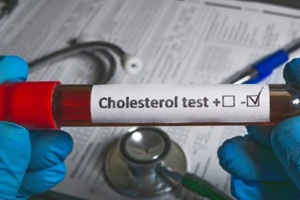 A cholesterol test provides insight into how your lifestyle influences your health, specifically heart health. By analyzing your HDL, LDL, and triglyceride levels, a lipid panel sheds light on diet, activity, stress, sleep, smoking, alcohol consumption, weight, medications, and more.
A cholesterol test provides insight into how your lifestyle influences your health, specifically heart health. By analyzing your HDL, LDL, and triglyceride levels, a lipid panel sheds light on diet, activity, stress, sleep, smoking, alcohol consumption, weight, medications, and more.
Your Diet Shows Up in Every Number
The composition of your diet directly affects your cholesterol numbers. For instance, consuming excessive trans fats and saturated fats increases LDL and triglycerides. These unhealthy fats are in full-fat dairy products, red meat, fried foods, baked goods, and some oils. Additionally, not getting enough omega-3 fats from fish, nuts, and seeds also increases the risk.
In contrast, a diet rich in fruits, vegetables, whole grains, beans, fish, and healthy oils improves cholesterol. This heart-healthy diet features plenty of soluble fiber, which helps remove LDL cholesterol from your body before it turns into plaque.
Physical Activity Levels Become Crystal Clear
While diet is important, exercise habits also show up on a cholesterol test. Being consistently active leads to higher protective HDL, lower LDL, and lower triglycerides. As little as 30 minutes of moderate activity daily makes a difference. More movement directly correlates to a better cholesterol profile. However, strength training combined with cardio provides added benefits by building calorie-burning muscle mass.
On the other hand, a sedentary lifestyle characterized by excessive sitting and minimal physical activity contributes to undesirable health outcomes. Overall, your activity routines, or lack thereof, become evident in your test results.
Stress Management Habits Appear in Your Results
Beyond physical factors, unmanaged chronic stress takes a toll on cholesterol markers. Stress hormones increase LDL levels and decrease HDL over time. That’s why learning to balance responsibilities, set boundaries, take breaks, practice gratitude, and release anxious thoughts reduces strain on your body.
Relaxation practices, including meditation, yoga, massage, and deep breathing, also elicit positive physical changes, which can lead to improved cholesterol levels. So, in essence, healthy stress management is not just important for your mental and emotional wellbeing; these mindful practices also measurably improve your cardiovascular health.
Sleep Quality is Reflected in Your Numbers
Similarly, the connection between cholesterol health and high-quality sleep is strong. Those who sleep less than 5 hours nightly tend to have significantly lower HDL compared to people who get 7 to 9 hours. In addition, short sleep duration and sleep disorders, such as insomnia or apnea, also raise LDL and triglyceride values.
 When you maintain consistent bedtimes, disconnect from screens before bed, follow sleep hygiene practices, and remedy issues that prevent quality sleep, your dedication to healthy rest patterns shows. In other words, prioritize sleep if you want to improve your cholesterol markers.
When you maintain consistent bedtimes, disconnect from screens before bed, follow sleep hygiene practices, and remedy issues that prevent quality sleep, your dedication to healthy rest patterns shows. In other words, prioritize sleep if you want to improve your cholesterol markers.
Smoking and Alcohol Habits Leave Their Mark
Unhealthy lifestyle choices, such as smoking, have predictable effects on cholesterol. Smoking cigarettes lowers HDL and raises total cholesterol, LDL, triglycerides, and the risk of plaque-filled arteries.
Excessive alcohol consumption also worsens lipid panel results. For example, drinking heavily on a regular basis can inflate triglycerides dramatically, sometimes over 1000 mg/dL. Quitting smoking and minimizing alcohol consumption are worth the effort, as these decisions will substantially improve your numbers.
Weight Management Efforts Show Clear Results
Just as harmful habits show, the scale doesn’t lie when it comes to cholesterol either. Carrying excess body fat, especially abdominal fat, unfavorably alters your cholesterol balance. However, cutting even a few pounds benefits all metrics. Shedding as little as 5-10 pounds can lower LDL and triglycerides markedly while boosting HDL.
Significant weight loss achieved through calorie control and exercise can lead to drastic improvements by reducing inflammation and insulin resistance. Weight management efforts will show in your numbers, since dropping excess pounds pays dividends for your lipid profile.
Medication and Supplement Usage Becomes Evident
In addition to lifestyle factors, the prescription medications you take may also influence cholesterol test findings depending on the mechanisms of action. Birth control pills and hormones can raise triglycerides and lower HDL in some women. Steroids, immunosuppressants after an organ transplant, HIV drugs, retinoids, beta blockers, and some anti-seizure medications also impact results.
Similarly, supplements such as niacin, fibrates, omega-3 fatty acids, garlic, and plant sterols, chosen to support cholesterol levels, directly affect lipid measurements based on varying effectiveness. Carefully track new medications and any supplements you are taking, as their effects might appear in follow-up testing.
Schedule Your Cholesterol Test Today
 Every aspect of your lifestyle is reflected in your cholesterol test results. Evaluating your diet, activity, sleep, stress, and other behaviors against your lipid panel results allows you to pinpoint what is helping or hurting your risk for heart disease. From there, working on just one or two positive changes can set off a beneficial chain reaction leading to improvements in future tests.
Every aspect of your lifestyle is reflected in your cholesterol test results. Evaluating your diet, activity, sleep, stress, and other behaviors against your lipid panel results allows you to pinpoint what is helping or hurting your risk for heart disease. From there, working on just one or two positive changes can set off a beneficial chain reaction leading to improvements in future tests.
Imperial Center Family Medicine’s cardiologists assess the full picture of your health profile and offer guidance that fits your distinct situation. Contact us today at 919-873-4437 or book an appointment online to receive personalized solutions that help boost long-term cholesterol wellness.
